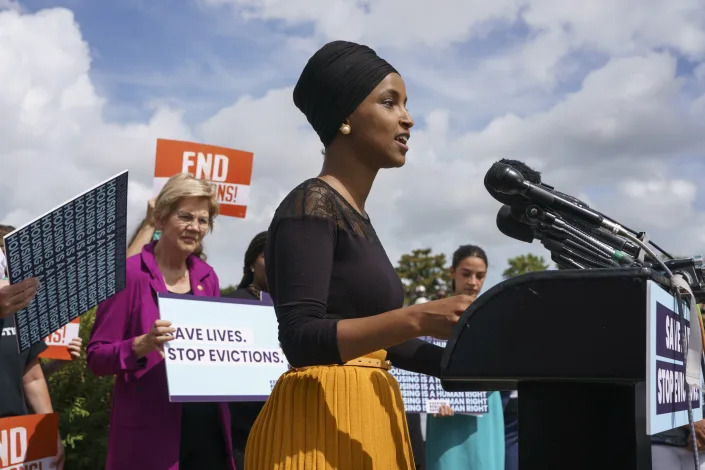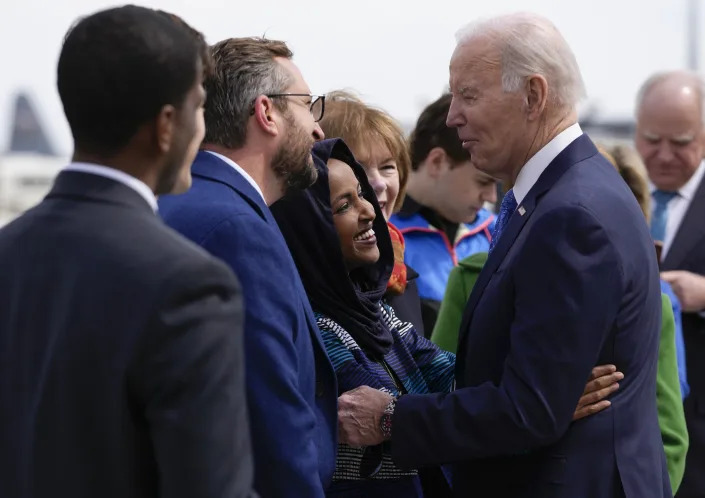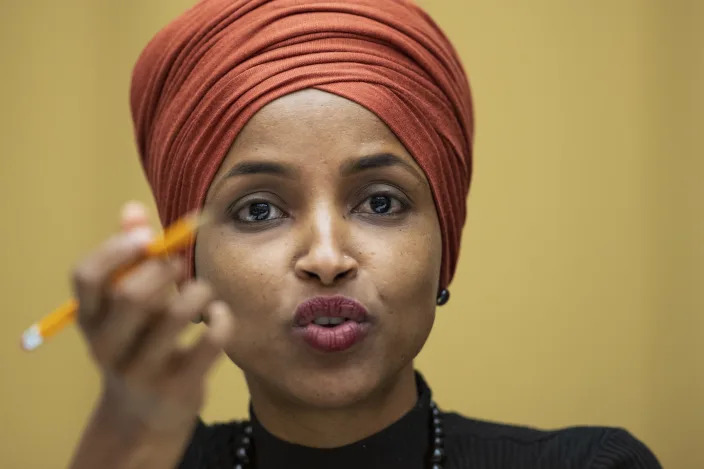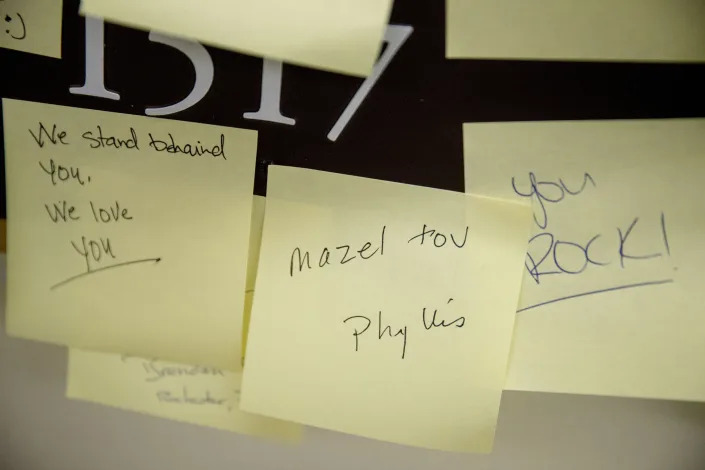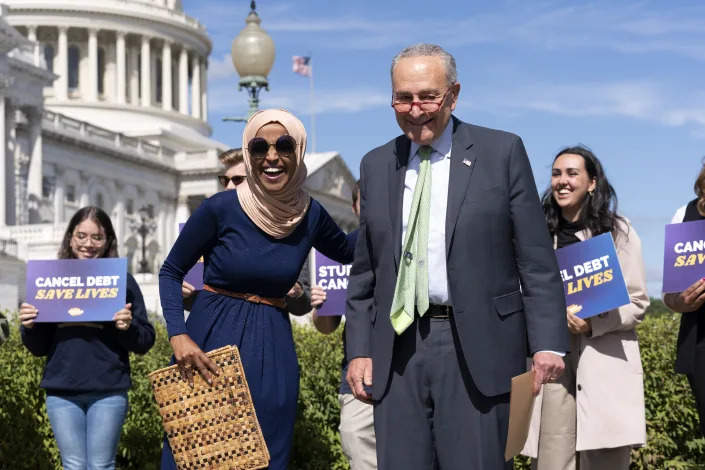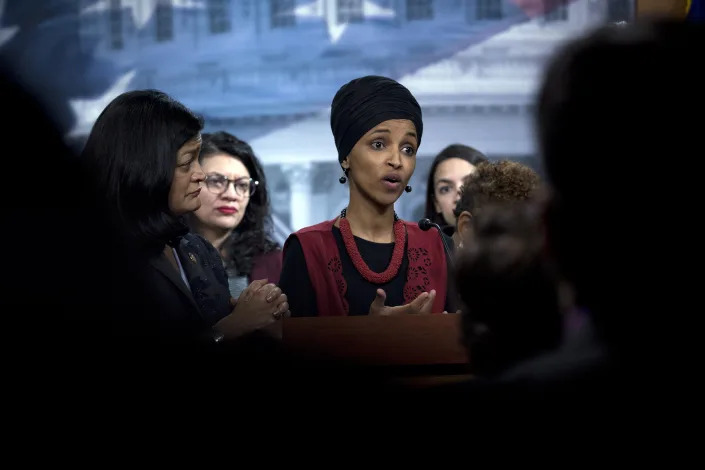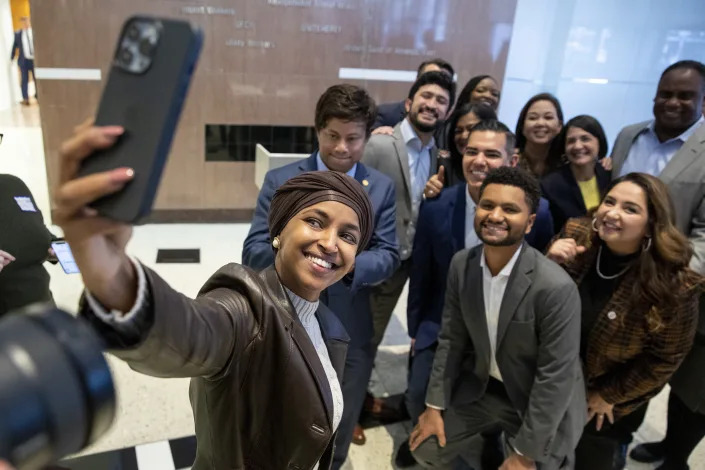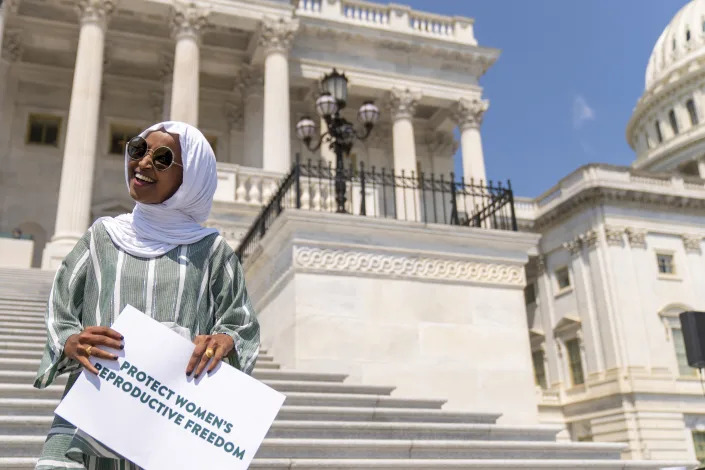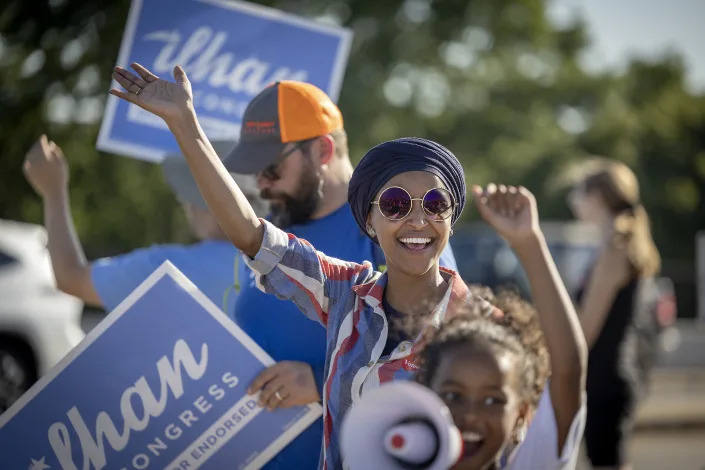
FARNOUSH AMIRI
Sun, April 9, 2023
WASHINGTON (AP) — President Joe Biden was winding up for a speech at a Minnesota clean energy facility when he spotted a lawmaker in the crowd whom he wanted to recognize.
“I want to thank you for being here,” Biden said, gesturing toward Democratic Rep. Ilhan Omar during his recent visit. “You never stop working to level the playing field for everybody.”
For Omar, the quick flash of praise from Biden — who was neither her first nor second choice to be the party's 2020 White House nominee — was more than just a courtesy shout-out during a presidential visit to her suburban Minneapolis district. It was a recognition of how far Omar has come after a rocky start to her political career that at times made her standing with Democrats appear tenuous.
As she settles into her third term, Omar is no longer defined by the “firsts” that accompanied her arrival in Congress: one of the first Muslim women in the House, the first refugee from Africa elected to the House, the first lawmaker to wear a hijab while on the House floor.
In interviews with nearly a dozen Democrats in the House and Senate, lawmakers portray Omar as a serious legislator who in the past four years has earned admiration for giving voice to marginalized groups often forgotten on Capitol Hill.
The best example of this came in early February when every single House Democrat voted against a GOP resolution to remove her from the House Foreign Affairs Committee over her past comments critical of Israel.
“I think we’ve been successful in making the Democratic caucus, Democratic Party, Democratic establishment to get to a place where they are able to see me fully, for all of the multiple identities I am a first for and not just to see and celebrate it but to defend it,” Omar told The Associated Press.
In the debate over her committee seat, many of Omar’s fellow Democrats, including those of Jewish descent, spoke out in the chamber about what they said was hypocrisy from the new Republican majority.
“I don’t need any of you to defend me against antisemitism,” said Rep. Jan Shakowsky, D-Ill. “My friend Ilhan Omar and I have worked together toward the values that I treasure as an American Jew and that she treasures as an American Islamic woman, the only one on the Foreign Affairs Committee.”
Democrats called it payback because they had used their majority in the last Congress to oust far-right GOP lawmakers from committees for their incendiary, violent remark s. But the emotionally charged floor debate over Omar was a departure from the bipartisan outrage she faced in her first year in office. At that time, Democrats were confronted by the reality that comes with diverse viewpoints when Omar — showing less deference to the party line — dragged the divisions over Israel into the open.
It began with social media posts in which Omar criticized pro-Israel lobbyist groups and questioned the loyalty of Jewish lawmakers who pushed back against her criticisms of the Israeli government.
Omar apologized for her comments at the time, both privately to her Jewish colleagues and publicly. She said what she was questioning was the influence game in Washington and voicing her concern that anything she said about Israel and its treatment of Palestinians would be construed as antisemitic.
In response, top Democrats began to draft a resolution that would have condemned antisemitism, with an early version even mentioning Omar by name. At the time, only a handful of Democrats inside and outside of Congress came to her defense.
Vermont Sen. Bernie Sanders, the highest-ranking progressive in Congress, said in April 2019 that Omar may “need to do a better job speaking to the Jewish community,” but that “it is not antisemitic to be critical of a right-wing government in Israel.”
Ben Rhodes, who was President Barack Obama’s deputy national security adviser, said that after meeting Omar early in her career, it was clear that she wanted to use her background to push for structural change in foreign policy.
“There are plenty of people in Congress that can represent the kind of established view of American foreign policy whether it’s on the Middle East or whether it’s on military policy,” Rhodes said. “There’s a desperate need for unconventional thinking and different perspectives, and that’s what she brings.”
The resolution that Democrats ended up introducing and passing in the spring of 2019 included condemnation of anti-Muslim bias but did not mention of Omar’s name. For the next several years, the former state legislator focused on bringing attention to issues that affected immigrants and families both back in her district and across Minnesota. And she gained support from various factions of the party as a result.
“The more time I’ve spent with her the more I’ve come to appreciate her perspective, the more I’ve come to realize how important her voice is to represent not just our community in Minnesota, not just in our country but many around the world,” Rep. Dean Phillips, D-Minn., another Jewish member of Congress. “It’s not about agreeing. This building was not built for agreement. It was built to manage disagreement. And I’d like to think that she and I can be the perfect example of that.”
Omar began to move up the ranks in the Congressional Progressive Caucus — one of the largest ideological caucuses in the House. She become the vote counter for the caucus chair, Rep. Pramila Jayapal, D-Wash., in the last Congress as progressives helped pave the way for Biden's agenda to pass the House and Senate.
In January, Omar was chosen by more than 100 members to serve as deputy caucus chair.
“She’s not gonna stop using her voice,” Jayapal said. “She’ll continue to use her voice on foreign affairs issues. Just kicking her off a committee is not going to silence her. She’s way too strong for that.”
Omar, who was born in Somalia, is now embarking on a new chapter “as a minority, in the minority," helping Biden and the Democratic Party provide a split screen to Republican control by highlighting the implementation of several legislative achievements made in the past two years, including the infrastructure law.
“Being taken off the committee is not a pleasant experience. But I think she’s gonna turn it into a real blessing,” said Rep. Jim Clyburn, D-S.C., who was an early supporter of Omar and is a member of the House Democratic leadership team.
Omar is also chairing a newly formed Africa policy working group, where she and more than a dozen House Democrats will focus on issues concerning the continent.
“We don’t agree on everything,” said Rep. Sara Jacobs, one of the group's members. "But we share a similar worldview, especially when it comes to the African continent, where we’
While many voiced concerns that her removal from the House Foreign Affairs Committee would effectively silence her on foreign policy, Omar said Republicans badly miscalculated, given that she was assigned to the House Budget Committee as a replacement.
“This is why I joke about the fact that Republicans taking me off the Foreign Affairs Committee essentially meant that they were promoting me,” Omar said.
“Because we will have the opportunity not only to address investments in regards to our foreign policy with development, defense, and diplomacy, but we will also be able to have more of a say as part as the discussions move forward in regards to our own defense budget.
Rep. Ilhan Omar waves to passersby for support during a voter engagement event on the corner of Broadway and Central Avenues in Minneapolis, Aug. 9, 2022. (Elizabeth Flores/Star Tribune via AP, File)
